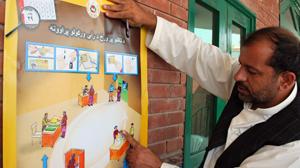KABUL - Patience is probably the one thing the electorate will need on polling day, which is just three days away.
Election officials say on average a person may take up to ten minutes to complete voting.
A voter should first stand in a queue before getting verified as genuine by IEC (Independent Election Commission) staff.
Voters can’t be verified as genuine unless they show fingers without traces of indelible ink and a valid voter registration card must also be shown.
Then, the right hand index finger of a verified voter is immersed in a bottle of indelible ink and a hole is punched in the voter registration card.
Two sets of ballot papers, each for the presidential and provincial council polls, are then given to each voter who needs to check for an IEC stamp on each ballot paper for it to be valid.
The one-page presidential ballot paper is green in colour, containing the names and election symbols of all 41 candidates.
For the provincial councils the ballot paper has multiple pages depending on the number of candidates in the area.
In Nangarhar for example in the east of Afghanistan there’s a five-page long ballot listing the photos and election symbols of all 275 candidates.
Rohullah Momand, 41, the IEC’s Public Outreach Officer for Nangarhar, said it should take about “two to three minutes” for an average voter from their verification to collection of their ballot papers.
Sifting through the pages of ballots and finding the candidate of their choice, will take most of the time said Mr Momand.
The voter, after finding their preferred candidate, will have to mark an empty box adjacent to the candidate’s photo and symbol by ticking or crossing the box taking care not to write outside the boundaries of the box.
“While educated voters and those who were reached by the voter education campaign may finish the entire process in as little as five minutes, others may take up to ten minutes,” said Mr Momand, who served in the 2004 and 2005 elections as a civic educator.
“It will be hard for them (the voters) to find their candidates (because of the long list),” he said, adding that priority will be given to people with disabilities.
People can vote quickly if they remember three things on the ballot paper: the photo, election symbol and serial numbers of their preferred candidates.
To speed up the process each polling station may have more than one polling booth, where eligible voters choose their candidates secretly, before casting ballots in the respective boxes for president and provincial councils.
Though the province of Nangarhar is going to elect 19 members with five reserved seats for women on the provincial council, voters will only be voting for one.
“The 19 candidates will be elected on the basis of the highest number of votes they get,” said Mr Momand.
By Tilak Pokharel and Shafiqullah Waak, UNAMA
Website: Independent Election Commission of Afghanistan






